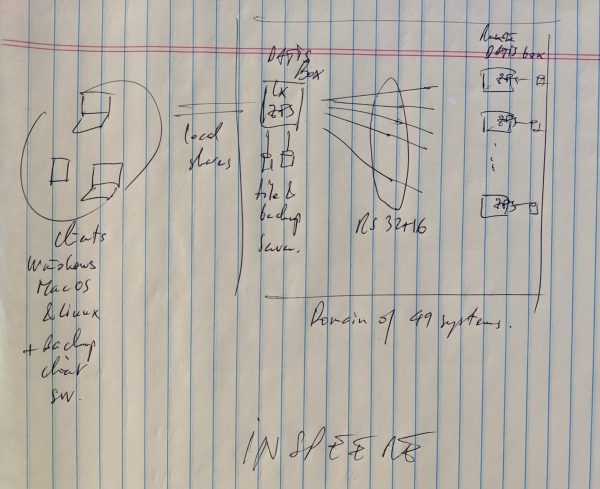Start-Up Profile: Inspeere
French firm with Blockchain-based backup solution
By Philippe Nicolas | April 15, 2022 at 2:03 pmCompany: Inspeere SAS
![]()
HQs:
Poitiers, France
Date founded:
Mai 2019
Capital:
€14 814,80
Founders:
- Michaël Ferrec
 , CEO, serial entrepreneur in the field of information technology for over 20 years. After a previous experience of creating the company Einden (in digital asset management solution), he was looking for an “impactful” project and was convinced by the idea of transferring from the academic domain to the corporate domain, the concept of a sovereign, eco-responsible, data center-less and highly cyber-resistant storage system, using the latest Distributed Ledger Technology (DLT).
, CEO, serial entrepreneur in the field of information technology for over 20 years. After a previous experience of creating the company Einden (in digital asset management solution), he was looking for an “impactful” project and was convinced by the idea of transferring from the academic domain to the corporate domain, the concept of a sovereign, eco-responsible, data center-less and highly cyber-resistant storage system, using the latest Distributed Ledger Technology (DLT). - Olivier Dalle
 , CTO, has held a university position for 20 years with University Cote d’Azur, and the I3S joint Laboratory of the University and CNRS. He was also a researcher with INRIA for 15 years, where he started working on distributed peer-to-peer storage in 2007. Continuously seeking to test, advance and merge computing and software technologies, he started to revisit the peer-to-peer distributed storage idea using DLTs and the ZFS file-system in 2016, which led to an IP transfer project and a patent initiated at the end of 2018.
, CTO, has held a university position for 20 years with University Cote d’Azur, and the I3S joint Laboratory of the University and CNRS. He was also a researcher with INRIA for 15 years, where he started working on distributed peer-to-peer storage in 2007. Continuously seeking to test, advance and merge computing and software technologies, he started to revisit the peer-to-peer distributed storage idea using DLTs and the ZFS file-system in 2016, which led to an IP transfer project and a patent initiated at the end of 2018.
Financial funding:
Initially self-funded by its co-founders, then supported by the French innovation frameworks: SATT SudEst PI transfer seeding, BPI France (labelled “deep-tech”), Nouvelle Aquitaine Region (projet “plate-forme numérique”), the Inspeere company has just started its first round of fund raising, seeking a closing in 2022.
Employees numbers:
In addition to the 2 co-founders, has hired a talented Ing. Dr. collaborator working on highly technical R&D aspects closely with the CTO, in addition to punctual free-lancers for more standard/mainstream devs; On the commercial side, following its B2B2B strategic plan, established commercial partnerships with multiple relay structures, including CQFD, Ambacia, Vienne Documentique, BureauTeam 64, and enrolling more continuously.
Revenue:
After a first conclusive seed phase in 2021 and 2022, aiming for a turnover of €1 million in the short term and a target of €15 million within 5 years.
Technology:
The start-up helps customers to re-internalise their backup storage in a fully managed service approach. It also helps its customers to better protect their assets from the increasingly aggressive Cyberworld, by developing collective and mutually beneficial automated threat responses. It holds exclusive rights on a Patented Distributed Ledger-based process to handle distributed storage resource management to ensure QoS at backup restore time. It also holds exclusive rights on a unique proprietary technology (undisclosed) that allows a ZFS filesystem to operate in a virtually distributed manner.
Products:
The firm distribute the Datis storage-focused system, that can exploit the potential of any Intel/AMD X64 platform (ranging from low-end PCs to high-end multi-bay rack servers). The resulting custom-baked appliance can be used either as pure storage with its transparently distributed (patented) ZFS-based backup, or as a multi-purpose all-in-one server (with the same automated ZFS-based backup), supporting a range of services (including virtualization and containers) for customers that want to minimize, reduce, or re-distribute at the edge their computing resources.
The appliance works like a SaaS service but at the edge instead of in a data center. It comes pre-configured and operational, requires no end-user maintenance, and is continuously updated using CI/CD DevOps advanced techniques.
Release and roadmap:
The current release is production ready and already distributed to customers through a network of distributor partners. Upon request, it can include (free of charge) a specially designed and fully maintained on-premises private cloud solution based on the popular Nextcloud.
A new O365 backup service (including Exchange, Sharepoint, Onedrive and Teams) is available to all users.
A new mass deployment and large-scale monitoring system, specifically designed for telecom operators who want to include a data center-less backup service for their large customer base is being developed. This specific version is scheduled to be finalized by 3Q22.
Pricing model and price:
Following a B2B2B model, the pricing model is mostly left at the initiative of the redistributing partners. However, compared to other externalized backup solutions, thanks to a mutual-service approach, the backup service provided by Inspeere easily allows for a set-price backup service, rather than volume-based service pricing.
The only requirement for the user to benefit from the set-price is to provision an appliance with 2x as much storage as required for its own use, and let other users use the over-provisioned storage (which ends up being much cheaper than provisioning growing amounts of storage in data centers).
Larger companies can also deploy multiple instances of the Datis system on their own sites and build their own proprietary distributed backup, without sharing any of their resources with other customers.
Go-to-market:
The solution is designed for all types of organizations, from small businesses to large groups or from small communities to large administrations.
Workloads/use cases/applications:
Storage appliance for SME typically range from 1TB to 12TB net, with a minimum local protection of RAID-1 or -5. It includes a supervision panel, remote statistics (Grafana dashboard), typical fileserver/NAS services, optionally Nextcloud, optionally a desktop/laptop backup client, optionally O365 backup (user and organization level).
Target market:
All IT, ranging from SMEs to large companies, single or franchise businesses, private or public sectors. Datis can also be coupled to telecom access points, dispersed IoT, and industrial systems, to which it can even provide specialized services thanks to its embedded virtualization system.
Competition:
In the fast-growing backup market, Datis is relatively unique since a large majority of its competitors provide their outsourcing backup storage using data centers. A few players also propose distributed solutions, such as Ugloo or Storj.io, but using different approach and techniques.
Comments
The company has strong root in academia like a few others in the domain of P2P and blockchain technologies. Globally, this decentralized domain is very active and dense for more than a decade with P2P initiatives represented today with blockchain-based projects.
We count more than 20 data and storage management projects and players: Aerofs (acquired by Redbooth in 2017), AetherStore, Airweave, Aleph, Blockade (dead), Cloudplan, Cubbit, Datomia (dead), IPFS, KerStor (acquired), KnoxFS, Kopit (dead), Memento Cloud, Opacity, Sia, Space Monkey (acquired by Vivint in 2014 and integrated now in the Vivint Smart Drive), Storj, Symform (acquired by Quantum in 2014, product dead), Transporter (from Connected Data merged with Drobo in 2013, acquired itself in 2015 now owned by StorCentric but stopped), Ubbey Tech (dead), UbiStorage (dead then reappearing under the Ugloo brand 2 times, still exists), Wuala (acquired by LaCie in 2009 later itself acquired by Seagate in 2012, product dead), to name a few.
Inspeere promotes a solution license from CRNS with an exclusive agreement giving them a solid background.
The product leverages ZFS and its read-only snapshot capability to distribute data across a network of similar machines. This dispersion establishes a network of ZFS systems all with a chunk of data and finally the team has transformed local ZFS into a set of dispersed independent ZFS peers. Pay attention: it's not ZFS above several systems but rather a network of independent ZFS servers unified by firm's software. One ZFS entity, we should say a Datis server in the Inspeere terminology, is talking to 48 other independent servers in a domain of 49. The product uses Reed-Solomon algorithm to distribute 32 chunks of data and creates 16 additional parities. It's not a distributed ZFS as ZFS is a disk file system but it is more a mechanism to distribute and disperse data via RS over a network of independent machines.

Recognized for its resiliency, ZFS is used in an incremental for ever mode and can be even configured into a near-CDP mode. The last copy is maintain locally on the Datis machine to satisfy RTO.
The Datis box operates a Debian Linux distribution equipped with ZFS, it is in fact a server operating as a file server for local clients and a backup server explained above. For clients running Windows, MacOS or Linux, users just need to any backup software able to save data to a network share, this is one being the Datis itself protected by Inspeere technology.
Really an interesting story that confirms the private cloud demand based on confidentially, regulations and sovereignty requirements.
There are currently 24 storage start-ups in France.
Additionally you can listen to this French episode of "The French Storage Podcast", an interview with Ferrec.













 Subscribe to our free daily newsletter
Subscribe to our free daily newsletter

